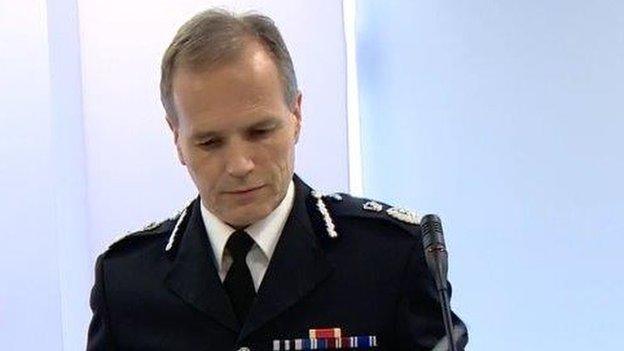Profile: Sir Stephen House, Scotland's first single police force chief
- Published
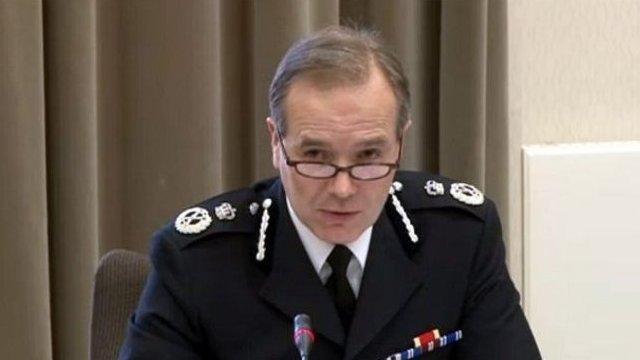
Sir Stephen House will step down in three months' time
Chief Constable of Police Scotland, Sir Stephen House, has stepped down from his role. So what have been the ups and down in his career?

When Sir Stephen House was appointed the first chief constable of the new Police Service of Scotland he was credited with being the best candidate because of his "impressive track record of leadership, partnership working and delivery".
Those were the words of the then Justice Secretary Kenny MacAskill who believed Sir Stephen would make "an outstanding" chief constable.
Before the 57-year-old took on the role in October 2012 - seven months before Police Scotland came into being - he already had an impressive CV of public service both north and south of the border.
Sir Stephen's police career began 34 years ago when he joined Sussex Police.

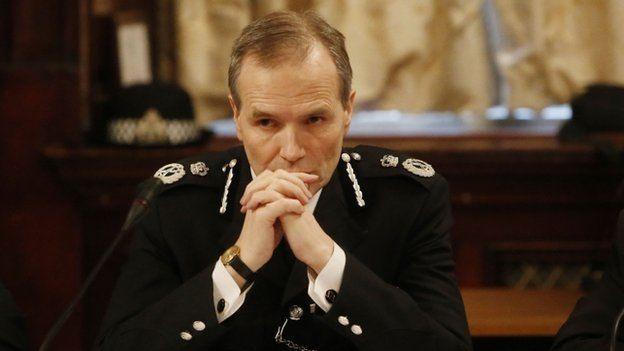
Sir Stephen House's career
1981 - Joins the police force in Sussex
1998 - Becomes assistant chief constable in Staffordshire
2001- Joins the Metropolitan Police Service
2005 - Assistant commissioner at the Met
2007 - Chief constable of Strathclyde Police
2012 - Chief constable of new Police Scotland

He was a uniform officer between 1981 and 1988, initially working for Sussex and then later transferring to Northamptonshire Police followed by West Yorkshire Police.
Sir Stephen's first taste of high command came in 1998 when he joined Staffordshire Police as an assistant chief constable, initially in territorial policing and later in crime and operations.
After three years in that job he joined the Metropolitan Police Service as a deputy assistant commissioner.
Despite what he described as his "estuary English" accent, Sir Stephen is Scottish, having been born in Glasgow.
He went to primary school in Scotland, but at the age of 12 his family moved to London.
Sir Stephen admits that at high school he lost the Scots twang, but he never lost his Scottishness, saying he felt and continues to feel "Glaswegian".
BBC Scotland's home affairs correspondent Reevel Alderson assesses Sir Stephen House's time as head of Police Scotland.
As a teenager he moved back north to study history and English literature at the University of Aberdeen.
But the bulk of his working life has been in England.
By 2005 he was an assistant commissioner at the Met and had been awarded the Queen's Police Medal.
Sir Stephen's career moved to Scotland in 2007 when he took over the role vacated by Sir Willie Rae, the then chief constable of Strathclyde Police.
The task was not to be underestimated as he was taking control of Scotland's biggest police force which had 10,500 officers and civilian staff, an annual budget of £550m and served an area covering 2.3 million people.
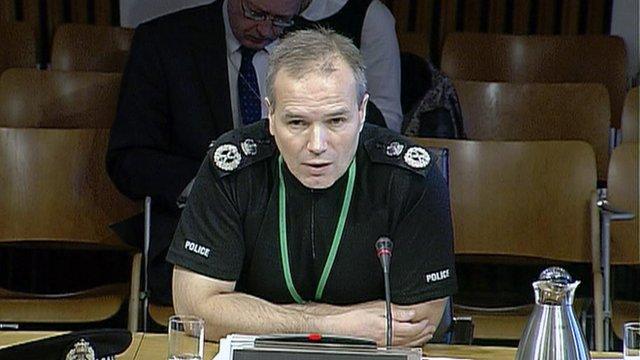
The Police Scotland chief constable has appeared a number of times before MSPs at Holyrood
Following the appointment, Councillor Paul Rooney, who was convener of Strathclyde Joint Police Board, said, external Sir Stephen had "impressed the panel consistently during his interview, and brought some really fresh and progressive ideas for the future".
In 2012 the father-of-three became the first head of the new Police Scotland service and it would prove the most challenging period of his career.
Politically, the merger of Scotland's eight regional forces was controversial with opposition parties voicing, and continuing to voice, concerns about the restructuring.
'Constructive tension'
Sir Stephen was quickly in the spotlight having to publicly justify to committees of MSPs how he was breathing life into this embryonic service.
Months before the single force was born, Sir Stephen got into an open spat with Vic Emery, the head of watchdog Scotland Police Authority.
In November 2013, at a Holyrood audit committee meeting he had to make it clear: "There's not a personality clash between myself and Vic and it is not a power struggle between myself and Vic - far from it.
"But it's been constructive tension in terms of, we want to do the best job that we possibly can."
Despite the challenges he faced and the criticisms he had to weather, in June 2013, Sir Stephen was knighted in the Queen's Birthday Honours for his services to law and order.
Sir Stephen House insisted that every officer treated domestic abuse seriously and that has had a huge positive affect on thousands of victims across Scotland."
During nearly three years as head of Police Scotland, Sir Stephen's name featured heavily in the media's headlines.
At the beginning of his tenure he was credited for taking the issue of domestic violence seriously.
Mhiari McGowan, who is head of independent domestic abuse advocacy project Assist, told the BBC: "He isn't the only police officer that took domestic abuse seriously, but what he did do was give strategic leadership and give a systematic approach.
"He insisted that every officer treated domestic abuse seriously and that has had a huge positive affect on thousands and thousands of victims across Scotland."
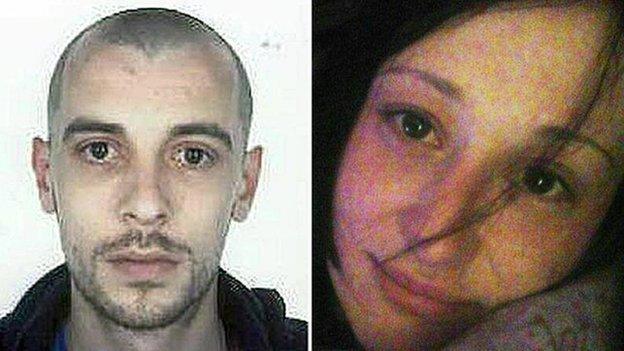
John Yuill and Lamara Bell lay for three days in a crashed car
However, he faced criticised for his decision to put armed officers on routine incidents, and the force's approach to stopping and searching juveniles.
Sir Stephen has had to handle the fallout from the M9 crash in July in which John Yuill and his partner Lamara Bell died after it took three days for officers to respond to reports of their car leaving the road near Stirling.
In a public apology, he said: "Our duty is to keep people safe and we've not done that effectively on this occasion, with tragic consequences, and I want to apologise to everyone for that."
Sir Stephen's officers are also being investigated by the Police Investigations and Review Commissioner over the death of Sheku Bayoh in police custody.
But he resisted calls for his resignation and received the public backing of First Minister Nicola Sturgeon.
Now, though, he will fail to finish the four-year, £208,000-a-year contract, he was handed in the autumn of 2012.
A rash of bad headlines about those in high office often casts a long, dark shadow.
However, the chairman of the Scottish Police Federation, Brian Docherty, says he has "little doubt" that history will prove to be kinder to Sir Stephen who delivered the "most significant public sector restructuring in a generation against a background of a brutal austerity agenda".
- Published27 August 2015
